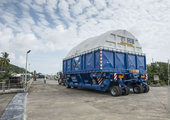Acerca de GalileoGalileo es el sistema de navegación global por satélite civil de Europa. Se permitirá a los usuarios de todo el mundo para conocer su posición exacta en el tiempo y en el espacio con gran precisión y fiabilidad. Una vez completado, el sistema constará de 24 satélites operacionales y la infraestructura de tierra para la prestación de servicios de posicionamiento, navegación y temporización.
El programa Galileo es financiado y es propiedad de la UE. La Comisión Europea tiene la responsabilidad general del programa, gestionar y supervisar la ejecución de todas las actividades del programa.
el despliegue de Galileo, el diseño y el desarrollo de la nueva generación de sistemas y el desarrollo de la infraestructura técnica, se prevén para la ESA. La definición, fases de desarrollo y validación en órbita se llevaron a cabo por la ESA, y co-financiado por la ESA y la Comisión Europea.
La Agencia Europea de Satélites de Navegación Global System (GSA) es asegurar la captación y la seguridad de Galileo. explotación de Galileo y prestación de servicios serán confiadas a la GSA a partir de 2017.
El programa Galileo es financiado y es propiedad de la UE. La Comisión Europea tiene la responsabilidad general del programa, gestionar y supervisar la ejecución de todas las actividades del programa.
el despliegue de Galileo, el diseño y el desarrollo de la nueva generación de sistemas y el desarrollo de la infraestructura técnica, se prevén para la ESA. La definición, fases de desarrollo y validación en órbita se llevaron a cabo por la ESA, y co-financiado por la ESA y la Comisión Europea.
La Agencia Europea de Satélites de Navegación Global System (GSA) es asegurar la captación y la seguridad de Galileo. explotación de Galileo y prestación de servicios serán confiadas a la GSA a partir de 2017.
Galileo’s Ariane 5 arrives at Europe’s Spaceport
30 August 2016
The first Ariane 5 rocket modified to carry four Galileo satellites into orbit has arrived at Europe’s Spaceport in French Guiana for a November launch.
So far, 14 Galileo satellites have been launched two by two on Soyuz rockets from French Guiana. This inaugural launch by Ariane 5 will boost that number to 18.
The MN Colibri roll-on/roll-off ship, built to transport European rocket elements, reached French Guiana’s Pariacabo Port on 22 August.
The cargo included Ariane’s cryogenic core stage, its upper stage and payload fairing. This Ariane variant is based on the launcher previously used to place ESA’s 20 tonne Automated Transfer Vehicle supply vehicle into low orbit.
This version has to carry a lower mass – four fully fuelled 738 kg Galileo satellites plus their dispenser – but needs to take it up to the much higher altitude of 23 222 km.
The target orbit is actually 300 km below the Galileo constellation’s final working altitude: this leaves Ariane’s upper stage in a stable ‘graveyard orbit’, while the quartet of satellites manoeuvre themselves up to their final height.
The four satellites to be launched by this Ariane 5 are due to be flown to French Guiana next week from ESA’s technical centre in Noordwijk, the Netherlands.
The Galileo satellite bus is built by OHB in Bremen, Germany, with the navigation payloads coming from Surrey Satellite Technology in the UK, involving supplied from all across Europe. They are then tested in simulated launch and space conditions in Noordwijk before being accepted for launch.
About Galileo
Galileo is Europe’s civil global satellite navigation system. It will allow users worldwide to know their exact position in time and space with great precision and reliability. Once complete, the system will consist of 24 operational satellites and the ground infrastructure for the provision of positioning, navigation and timing services.
The Galileo programme is funded and owned by the EU. The European Commission has the overall responsibility for the programme, managing and overseeing the implementation of all programme activities.
Galileo’s deployment, the design and development of the new generation of systems and the technical development of infrastructure are entrusted to ESA. The definition, development and in-orbit validation phases were carried out by ESA, and co-funded by ESA and the European Commission.
The European Global Navigation Satellite System Agency (GSA) is ensuring the uptake and security of Galileo. Galileo operations and provision of services will be entrusted to the GSA from 2017.
ESAGuillermo Gonzalo Sánchez Achutegui
ayabaca@gmail.com
ayabaca@hotmail.com
ayabaca@yahoo.com
Inscríbete en el Foro del blog y participa : A Vuelo De Un Quinde - El Foro!





No hay comentarios:
Publicar un comentario